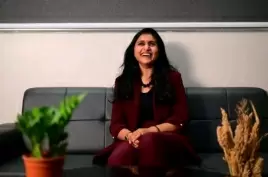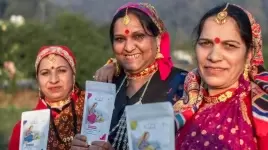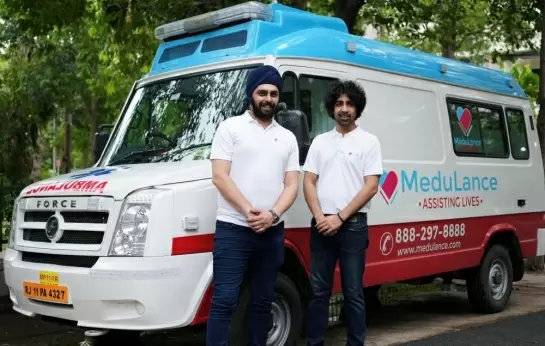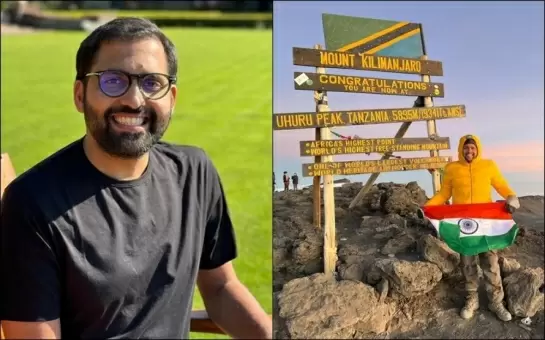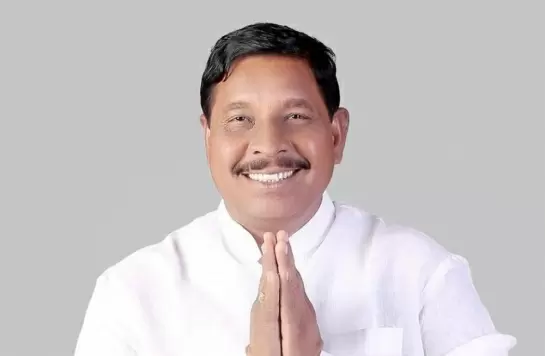They do not even get paid for cleaning toilets in UP villages

03-May-2012
Vol 3 | Issue 18
After much delay, the government of India is planning to introduce a new Act for eradication of manual scavenging and rehabilitation of the manual scavengers. The existing law – Employment of Manual Scavengers and Construction of Dry Latrines (Prohibition) Act, 1993 – had failed to realize its objective.
Every year the government provides fictitious data about the number of manual scavengers in the country.
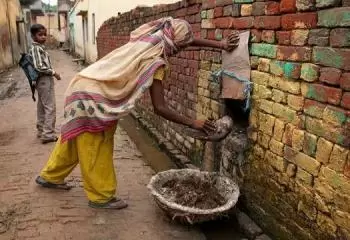 |
|
India has to eradicate manual scavenging at any cost
|
The States have lacked both vision and commitment to eliminate manual scavenging. It is unfortunate that the inhuman practice still continues in a State like Uttar Pradesh despite all talks of so-called political empowerment.
Take Sonadih, a village in Bhanvarkol block of Gazipur district in Uttar Pradesh. Ghazipur is on the bank of river Ganga and is about 2 hour drive from Varanasi city.
From Ghazipur city, it takes a 35 km bumpy ride to reach Sonadih, a village dominated by the Bhoomihar community, known for its powerful political nexus and control over land.
Sonadih has a population of over 6500 people. The plight of the manual scavengers in this village is very pathetic and distressful.
As usual, the bastee of the scavengers is the last one in the village, and it is virtually unapproachable during the rains due to the water logging.
But even in such conditions, the women members of the community venture out of their houses to clean the latrines of the other villagers.
A typical village culture prevails in Sonadih, where a member of a Dom community – another scheduled caste – would refuse to sit with those from the scavenging community.
Bhoomihars, Brahmins, Yadavs, Chamars, Muslims, and Dhobis also live in the village. But each community lives in its own ‘nation’ with clear social barriers. There is no chance of the communities touching each other or coming together for a social cause.
There are about ten families of Rawats (the scavenger community in the region) in the village. Since most of the homes in the village do not have the flush latrine system, the duty of the community is to visit each of the houses and clean the toilets every morning.
They are not paid in cash for their work. They receive 5 kg rice or wheat every year, apart from leftover food every day and special alms during the festivities like Dipawali, Dussehra and Holi.
The Rawats do not have a small piece of land to call their own. It is said that two Muslim landlords brought these people to the village to do the scavenging work.
They have been given half acre of land where they are presently living, but they could be thrown out from their dwellings the day they refuse to do their allotted work.
Paradoxically, all scavenger families have Above the Poverty Line (APL) ration cards and cannot purchase anything from the subsidized shops.
Due to complete landlessness, they also cannot benefit from the Indira Awas Yojana, a faltering housing scheme by the government of India, since grants are given only to those who have land.
Our trip to the village generated much enthusiasm and suspicion. Many of the upper caste people who had these women as their toilet cleaners were not only apprehensive but blamed the victims themselves.
The problem is that the dependency of the scavenging community on the upper castes is so much that they feel threatened with the idea of any change.
Their attitude appeared to be: If we don't do the work, we would lose our homes. People like you who pretend to work for the community come and go but we have to live along with the people here.
While preaching is easy, the fact is that civil society has failed to do anything for them. ‘Advocacy’ won't resolve the crisis of the community.
The pain of the community is further aggravated by some ignorant voices who blame the community for not ‘following’ the path of Baba Saheb Ambedkar.
However, our aim is not to go into a debate at the moment. We just want to narrate the plight of the community in a village where they are suffering and we need to develop an idea.
Some of the village elders suggested that though not all are in a position to install flush toilets, an initiative has to be made. Since sanitation programmes are mostly introduced in the urban areas, the villages stay neglected.
As mentioned many times in our reports, the scavenging profession has been totally feminized. The men not only try to get jobs in the Nagarpalikas i.e. municipalities, but also migrate to big cities in search of jobs.
For women, the job is doubly tiring as they not only have to take care of the family but also face the numerous indignities of life. In the absence of resources they end up begging and doing whatever is demanded from them.
The cases of some of these women are pathetic. Sudhani Devi is mother of a son and two daughters. She not only does manual scavenging in Sonadih but also in other villages within the vicinity of 5 kilometers. She cleans a total of 15 toilets.
Munni is taking care of 16 families in Rasada and Sonadih villages. A mother of three, she starts her work at 6 am daily.
Similarly, Manju works in 15 houses in three villages. A mother of six children, she says that they have no future.
All of them are completely disgruntled and they do not have a clue as to what they should be doing. Many do not even have a ration card. Now the question arises whether they can do any other work at all?
The problem is that the Panchayat does not even think of them. They are not even considered citizens of the village. Since they don’t own land, they are living in the mercy of the villagers.
They are afraid to challenge the supremacy of the villagers because that would virtually seal their fate and throw them on the streets. For this reason, they do not even admit that they are being forced to work.
The problem is their landlessness. If they are provided with some agricultural land, they would be able to earn their livelihood.
The Panchayat could build some community toilets at the village and hand over the management to these women. A biogas plant can be installed and electricity and cooking gas can be provided to the subscribers in the village.
Unless we resolve to eliminate the caste bias from our minds, untouchability and manual scavenging will continue. We continue to shame ourselves. Those who clean up the 'dirty work' do not even get paid for it.
That is a perfect example of a racist society which still believes in slavery.
Unless manual scavenging and untouchability goes, India’s claim to a glorious civilization will always be questioned and scrutinized.
Vidya Bhushan Rawat is a freethinker, a humanist and a human rights activist


